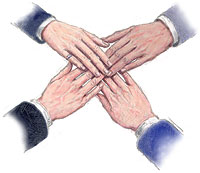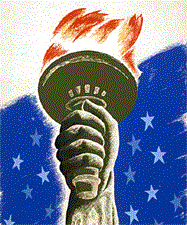 A palpably rejuvenated Prime Minister Girija Prasad Koirala is insistent that Nepal should retain a “ceremonial monarchy”. Maoist supremo Prachanda is busy wooing foreign ambassadors (at least the ones eager to receive him), apparently cognizant that retaining power would prove far more arduous than attaining it.
A palpably rejuvenated Prime Minister Girija Prasad Koirala is insistent that Nepal should retain a “ceremonial monarchy”. Maoist supremo Prachanda is busy wooing foreign ambassadors (at least the ones eager to receive him), apparently cognizant that retaining power would prove far more arduous than attaining it.Nepali Congress (Democratic) president Sher Bahadur Deuba is on a weeklong visit to India for – by his own admission – serious political consultations. Unified Marxist-Leninist (UML) general secretary Madhav Kumar Nepal, sensitized by the growing camaraderie between sections of the Nepali Congress and the Maoists, has emerged as the preeminent supporter of the Nepal Army within the Seven Party Alliance (SPA).
A passionate realignment of politics seems to be underway. To be sure, the precise motives and possible outcomes remain obscure. Yet this much is clear: In the run-up to the constituent assembly elections, Nepalese politics seems to be crystallizing into republican and ceremonial monarchist camps from their hitherto tri-polar dimensions.
Prachanda seems reconciled to a transitional democracy of sorts. In an interview with a Kathmandu weekly, the supreme commander in chief of the Maoist army speaks of spearheading another revolution for a “people’s republic” in about five years’ time.
Bam Dev Gautam, Prachanda’s principal adherent in the UML, claims Nepal could do without American assistance.
Gautam was responding to Ambassador James F. Moriarty’s assertion that Washington could not recognize or financially reward a Maoist-inclusive interim government unless the rebels fully and verifiably disarmed. The interesting part is that Gautam used his address to an agriculture conference to accuse Moriarty of conspiring with the palace to subvert the budding peace process.
What could be the possible permutations of the emerging politics? Radical communists within the UML could veer closer to the Maoists, while more “moderate” comrades could rally behind a ceremonial monarchy – for a variety reasons unrelated to any royalist sympathies.
Clearly, UML general secretary Nepal’s sudden warmth toward the military is the outcome of his perception that Koirala and Prachanda have resolved to annihilate the mainstream communist party.
The fact that the UML, which already had drafted an interim constitution as part of an internal exercise, was excluded from panel entrusted with writing the statute, has heightened suspicions. Prachanda’s sustained assaults on the UML after overshadowing its general secretary at the June 16 news conference have only deepened this distrust.
Perhaps sensing the possible scenario, Prachanda has started sounding a little contrite about his declaration that the Nepal Army was never anything but a bunch of murderers, rapists and plunderers – a remark Madhav Nepal roundly criticized, triggering the speculation of a UML-military alliance.
Within the Nepali Congress, Prime Minister Koirala and Deuba could reunite their parties behind a platform of a ceremonial monarchy. Pro-republic members like Home Minister Krishna Prasad Sitaula – if that is what he really is – could find themselves closer to the radical communists. (Although it is not entirely clear how republican Nepali Congress leaders like Ram Chandra Poudel and Narahari Acharya could seek ideological succor in the likes of Sitaula.)
The mainstreaming of “royalist” parties would be easier this time than after the 1990 changes. Although not part of the SPA the Rastriya Prajatantra Party (RPP) led by Pashupati Sumshere Rana was in the opposition camp during King Gyanendra’s 15-month direct rule. The Rastriya Janashakti Party of former prime minister Surya Bahadur Thapa, too, opposed the palace’s direct rule without being part of the SPA.
Over the months, the RPP led by Kamal Thapa, King Gyanendra’s home minister, and other smaller parties represented in the royal cabinet could join a broader ceremonial monarchist platform.
At a practical level, an extended period of the kind of reflection the palace is currently in would allow the monarchy to accumulate enough energy to head into the robustness of the constituent assembly campaign season.
Admittedly, the missteps and compulsions of the government would facilitate a more dispassionate assessment of the palace’s assertiveness over the last four years. Some clouds are already starting to clear in other ways. The auditor-general’s comments at a Kathmandu gathering this week, for instance, suggested that the Royal Palace fell far short of spending the outrageous proportions of the treasury its critics so vociferously contended.



